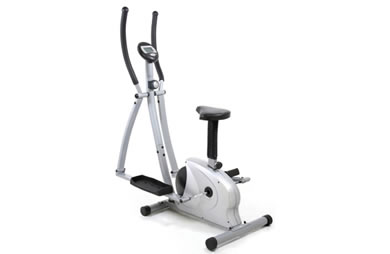|
Aerobic exercise (think running, biking, and jumping rope) is good for your health, helps with weight loss and generally makes you feel good. But believe it or not, you can have too much of a good thing—even exercise. It's important to find the balance between challenging yourself, making exercise a regular part of your daily routine, and doing more harm than good. But where exactly is the line where a healthy amount becomes too much? Cardiovascular exercise burns calories and strengthens your heart and lungs. So the more you do, the better off you'll be, right? Not necessarily. It is possible to do too much cardio. What counts as "too much" is different for everyone, and depends on a lot of factors, including the intensity of your exercise, your fitness level, your age and health status, how much activity you do each day, what and how much you eat, how much sleep you get, your fitness goals and more. What might be too much for one person is perfectly fine for another. What might be too much for a new exerciser could also be fine for them a year later. Even though exercise is good for us, our bodies perceive it like any kind of stressor. Chemically, the body reacts the same way to exercise as it does to "bad" stress. Therefore, too much exercise (or not enough recovery) can have negative effects on your physical and mental health (including your metabolism). In addition, too much cardio specifically can result in muscle wasting (atrophy), which is not the outcome you want. In extreme cases, even the heart suffers from too much endurance training. When it comes to exercise, picture a bell curve: The people who reap the most health benefits are somewhere in the middle. The people on either extreme end—too much exercise or too little—suffer consequences. When you listen to your body, it will usually give you signs that it's time to cut back or slow down with the exercise. If you answer YES to any of these questions, you could be doing too much cardio.
The vast majority of people who exercise consistently and recreationally will not fall into problems of doing "too much" exercise. More competitive exercisers, especially those who train for endurance and ultra-endurance events (think Ironman triathlons, multiple marathon distance races in a year, century bike rides, and ultra-marathons longer than 26.2 miles) are at a greater risk of hitting the ceiling of too much exercise. Every individual is unique and some athletes can participate in these types of sports for years without ever running into problems. Exercising in Moderation The American College of Sports Medicine recommends that adults get at least 150 minutes of moderate-intensity exercise per week to achieve baseline levels of health and fitness. Obviously, a lot of exercisers do much more than this, but for beginners, these recommendations are something to slowly work up to as you become more fit. Even "moderate" levels of exercise can be too much if your body isn't accustomed to it. Anytime you start a new fitness program, it's important to ask yourself "Is this a routine I can keep up for the rest of my life?" Although you might want to exercise for two hours each day, that's not something most people can maintain forever before physical and/or mental burnout sets in. Even marathon runners take rest days and aren't training for races every day of the year. When it comes to cardio exercise, the quality of your workout is much more important than how long they last, so if you can walk at a very challenging pace for 30 minutes, that's often a smarter use of your time than walking slowly for 90 minutes, for example. SparkPeople recommends taking 1-2 days of rest each week from exercise. Many of the world's top athletes prioritize rest and recovery just as much as they do their actual training. In fact, it is during the recovery time that your body rebuilds and becomes stronger because of the work you put in. Some people prefer to take "active rest" days, meaning you do light activities like take a walk or a yoga class. Rest days don't mean you're lazy. They mean you're smart and know to give your body the rest that it needs. It's also important to alternate between higher intensity and lower intensity workouts throughout the week. All exercise intensities benefit the body in different ways, so variety is essential in a well-rounded fitness program. But if every workout you do takes place at a high intensity, it could add up to "too much" if you are not taking adequate rest days. You shouldn't be trying to go all-out in every workout you do. If it really makes you nervous or uncomfortable to rest or cut back on your exercise even though you know you should, read When Too Much Exercise Becomes a Problem. |
Popular EntriesRelated Entries
More From SparkPeople
|







.jpg)















